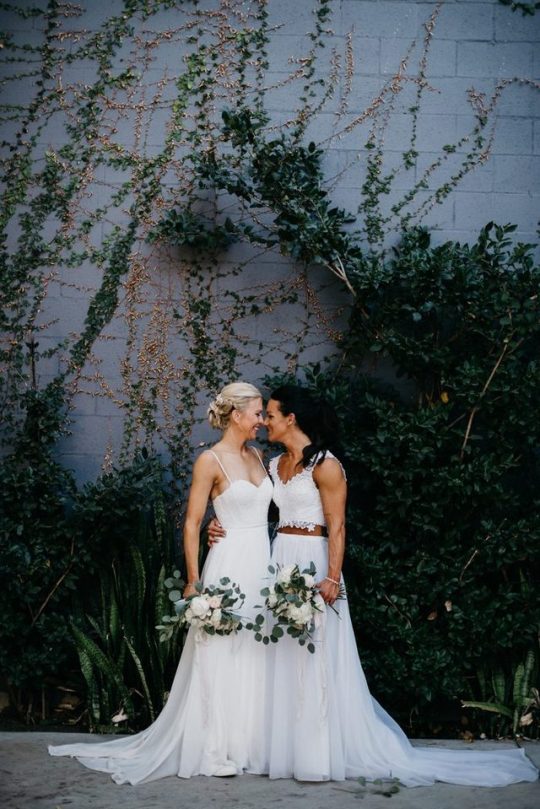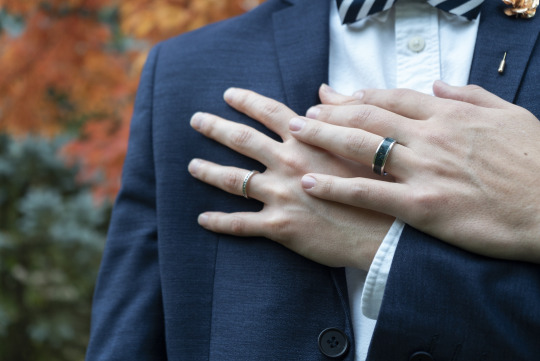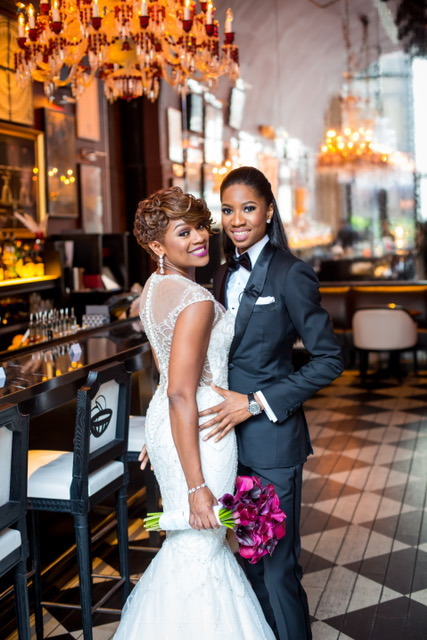Polychrome is wedding videography for the 21st century.
Don't wanna be here? Send us removal request.
Text
Me: -says gay marriage instead of same-sex marriage because you don't have to be the same sex as your partner for it to be gay-
Transphobes: -visibly irritated-
15 notes
·
View notes
Photo
Fabulous

205 notes
·
View notes
Photo
Gorgeous!!

240 notes
·
View notes
Photo
Killing it^^^

256 notes
·
View notes
Text
New Rules, Old Game
How to plan for a wedding in the 21st century.
By Lucy Dahl
via Polychrome
It doesn’t take long after you get engaged to learn that people have opinions about weddings, strong opinions. Wedding customs and traditions have built up over thousands of years and aren’t meant to guide us to being kind to one another, but sometimes it can be quite suffocating. In the early stages of planning my wedding, I got hooked on scrolling through Weddingbee forums, and truly, it waxes dramatic. Some of these people are downright venomous. In one thread, a very sweet woman asked if others thought it might be ok for her to host a pre-wedding bridal luncheon for herself in lieu of a shower since she had no family and had just moved to a new town, and the comments got nasty. I certainly did not expect to find actual cyberbullying on etiquette websites, but here we are.
Despite these deeply held convictions, the indisputable fact of the matter is that this wedding belongs to you, and you get to make the calls according to your own priorities and limitations. Here are some hard-and-fast etiquette guidelines that I think our modern society could stand to get a little flexible with:
The $$$
Money can be very touchy and can also come with a lot of strings (which some might choose to avoid). In the past, weddings were primarily paid for by the bride’s father and the rehearsal dinner would be covered by the groom’s. As people are getting married later in life, more and more couples are covering the cost of their nuptials on their own. The big thing here is to manage your expectations. My in-laws were unwilling to pay for the rehearsal dinner, and my family (who is footing much of the bill) was very mad about it. While it isn’t always possible to cover the cost of a wedding yourself (because weddings cost a lot of money), it is good to keep in mind that as our culture moves forward, so should expectations about who should pay for what.
Plus Ones
I have yet to find a wedding website that doesn’t demand that you invite every person’s significant other (or at least the extra significant ones), and some go as far as to say you have to give every single person a plus one. This is one of the rules I rail most vehemently against because it ignores a very important wedding-planning truth: guest limits. Whether it be a venue limit or budget constraints, sometimes it’s either your lifelong family friend or your spouse-to-be’s high school friend’s girlfriend that you met once and neither of you like. Of course, not inviting a guest’s SO could be interpreted as an insult, but since verbal communication very much exists and stands to be an option, I have found that most people understand exactly why you might want your high school mentor there instead of the guy your polyamorous friend has been dating for a year but you never met because you met her through her recently-former primary. This is a very big occasion in your life, and if there are stringent limits on how many folks you get to invite, it is reasonable to prioritize the people you care about most.
Shower Guests
In the same vein of people-are-capable-of-understanding-the-limitations-of-wedding-venues-and-that-they-are-not-the-center-of-the-universe, there are certainly times where it could make sense to invite someone to a wedding shower but not the wedding. Maybe you want to have a shower with your ceramics class but there are 20 of them, and your venue only seats 100. Or maybe you made a new friend between when you made your hard-and-fast guest list and when you actually got married, e.g. when your wedding got delayed a full calendar year because of COVID but only after you had sent out formal invites (am I getting too specific?). I’m not suggesting that this can never be a tactless thing to do, and I would very much recommend that you ask them to not bring a gift if you cannot invite them to the wedding, but much of the time, people understand. When you’re navigating another person’s expectations, it is always great idea to be forthright, and weddings are no exception.
'Thank You' Cards
Maybe it was my upbringing in the American Southeast, but I am a big thankyou card person. I firmly believe they are important. But I also acknowledge that you are a human being, and we live in the era of smartphones. There are lots of tidbits of advice floating around about the timing a couple should have, and some of it is outright conflicting. You have a three month deadline to send it or you shouldn’t send anything for a year? No clue. Just do it as efficiently as you can. The world has become a very exhausting and complicated place over the last year, and I think we could all have some perspective on why a person may not get to these right away. The important thing is that you express gratitude. You can do that with a phone call, a thoughtfully-written direct message on Facebook, or even (shocker) a thankyou card that came four months after the wedding. But word of caution: be thoughtful of how the method of communication will be received. Your grandmother might not be thrilled to get a thankyou text.
“Junior Bridesmaids” and Other Attendants
In 20th century white America, flower girls were not people’s grandmothers. But here and now, in the post-post-modern world, the flower girl can be whoever you damn well want it to be. Mine is my nephew, and we’re calling him a “botany boy”. You do not have to limit the ways you designate attending roles at a wedding. Do you have an 11 year old sister you want to involve but she’s too old to be a flower girl and too young to be a bridesmaid? Then involve her and call her whatever you want! In my opinion, the only limitations on age for roles played in a wedding should be the capacity to walk yourself up and down the aisle. Otherwise, get weird with it.
White Dress
While most etiquette writers have abandoned the idea that virginity is a prerequisite for wearing white by now, there are still several who seem to believe that you should only wear white for your first wedding. However, this can substantially limit your wardrobe options, not to mention it is not anybody else’s business what you wear, literally ever and doubly on your wedding day. If a white fit catches your eye, go for it! You don’t have to broadcast “subsequent wedding” if for any reason it is important to you to wear white (and liking a dress counts as important). N.B. you also can skip white for your first wedding. Do you.
Speeches
Traditionally, the bride’s father, the best man, and the groom are the ones to make formal toasts at a wedding. That is really a lot of male talking. Please feel free (more than free, actually) to include some feminine/non-binary voices in the mix. If the idea of your dad addressing your wedding guests makes you squeam, ask your mom or another relative. Or just don’t do speeches! My childhood best friend got married at 18, and for some reason having to do with her (now ex-)husband’s very bizarre life choices, her 15 year old brother was chosen as the best man. When he was invited to the stage to give the toast, he spoke at length about how uncomfortable it was to think about the groom “touching his sister and stuff.” While it was hilarious and also made my maid of honor speech sparkle by comparison, I recommend stepping outside of tradition and designating public speaking roles only to people who know what to do with them (or not having them at all).
Seating, Processions, and the Rest of the Show
There are endless lists about who should sit where and who should walk when, but like all of my advice, sometimes there are reasons you want to or have to do it differently. Some people don’t have male relatives to give them away, and the idea of asking someone else to fill in is painful. Sometimes people have a very specific reception layout because of their venue, and it cannot involve their parents sitting next to them. Sometimes people think printing a program for a wedding is stupid. But you don’t have to have a reason to do things differently. Keep the traditions that appeal to you, and ditch the ones that don’t.
As you plan your wedding and inevitably have to deal with unsolicited opinions, remember this: we have just survived an unprecedented year of civil unrest, a global pandemic, and the absolute destruction of people’s livelihoods. Now more than ever, we need to give one another room for our humanity, and that sometimes means deviating from the course of tradition.
2 notes
·
View notes
Photo

Justin + Lucas
0 notes
Video
tumblr
Dreamy
1 note
·
View note

